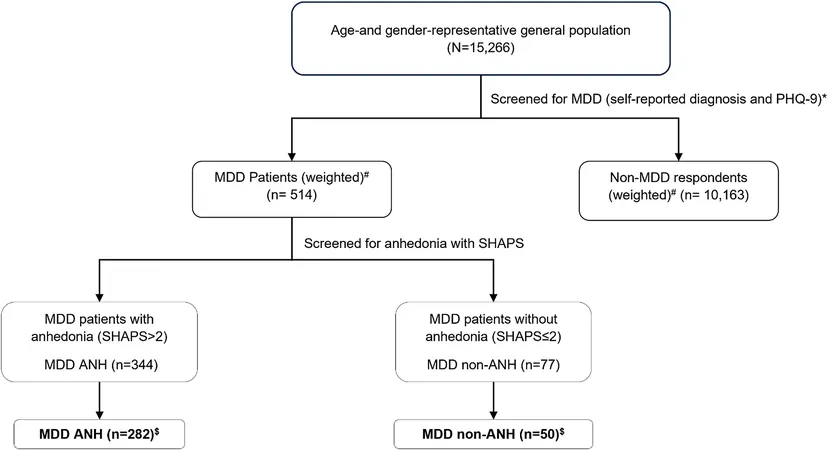
Unlocking the Mystery of Anhedonia in Japan's Major Depressive Disorder: Insights and Unmet Needs
2025-07-01
Author: Jacob
A Silent Crisis: Major Depressive Disorder in Japan
Major Depressive Disorder (MDD) is a leading cause of disability worldwide, affecting a staggering 246 million people globally. In Japan, a nationwide survey conducted between 2013 and 2015 revealed that 5.7% of the population suffers from MDD, with 2.7% experiencing it within the last year. The urgency to address MDD in Japan is underscored by the country's notably high suicide rates, ranking ninth globally.
Understanding Anhedonia: The Hidden Barrier to Recovery
Anhedonia, the inability to feel pleasure, is a core symptom of MDD and other mental disorders, complicating both diagnosis and treatment. According to the DSM-5-TR, anhedonia is crucial for identifying major depressive episodes. Shocking statistics show that approximately 35-70% of those with MDD experience anhedonia, making it a formidable barrier to effective treatment.
The Complexity of MDD: A Multifaceted Challenge
MDD manifests as a syndrome that intertwines emotional, physical, and cognitive symptoms, significantly impacting patients' quality of life. Anhedonia often stems from dysfunctions in the brain's fronto-striatal and prefrontal pathways, presenting ongoing challenges for treatment. Unfortunately, standard antidepressant medications frequently fail to alleviate this debilitating symptom, leading many patients into a cycle of prolonged treatment with varying degrees of success.
An Urgent Call for Research: Anhedonia in Japanese Patients
Despite the prevalence of anhedonia, it remains largely under-explored in Asian populations, especially in Japan, where research has mostly focused on its effects in conditions like Parkinson's Disease or postpartum depression. This lack of targeted research highlights a critical gap in effective interventions for MDD patients experiencing anhedonia.
Surveying Patient and Physician Perspectives: A Study Overview
A recent study aimed to assess the prevalence of anhedonia in MDD patients across Japan, gathering insight from both patients and physicians. Conducted through online surveys from April to May 2023, the study aimed to shine a light on the unique experiences of those grappling with MDD and anhedonia.
Revealing the Numbers: Prevalence and Patient Characteristics
In a sample of 15,266 participants, 12.7% reported moderate to severe depression. Specifically, 66.9% of those with MDD also experienced anhedonia, revealing a significant intersection between these challenges. The average age of patients with anhedonia was 46, and a sore spotlight was cast on their treatment trajectories.
Physicians' Insight: A Disconnect in Treatment Focus
Interestingly, 90% of physicians admitted they do not focus on treating anhedonia separately from MDD, despite agreeing with its definition. This suggests a potential disconnect between clinical practice and the realities faced by patients. Furthermore, physicians reported seeing only a fraction of MDD-ANH patients compared to the actual prevalence, raising concerns about underdiagnosis.
Patient Perspectives on Treatment: A Mixed Bag of Expectations
Patients with anhedonia prioritized reducing anxiety and improving their sleep quality as treatment goals, while physicians focused on restoring social functionality and preventing suicidal thoughts. This divergence highlights a gap that needs bridging through improved communication and shared decision-making.
The Way Forward: Targeting Awareness and Treatment
There's an urgent need to enhance awareness of anhedonia among both patients and physicians in Japan. Addressing the gap in treatment expectations and satisfaction is pivotal for optimizing outcomes in patients with MDD. Efforts must be made to incorporate validated assessment tools and develop targeted therapies specifically designed to address anhedonia.
Conclusion: A Crucial Next Step in Mental Health Management
As the prevalence of anhedonia becomes more recognized globally, the urgency for Japan to adopt a more focused approach in diagnosing and treating this symptom is clear. Greater awareness and targeted strategies are crucial in alleviating the burden of MDD and enhancing the quality of life for those affected.









 Brasil (PT)
Brasil (PT)
 Canada (EN)
Canada (EN)
 Chile (ES)
Chile (ES)
 Česko (CS)
Česko (CS)
 대한민국 (KO)
대한민국 (KO)
 España (ES)
España (ES)
 France (FR)
France (FR)
 Hong Kong (EN)
Hong Kong (EN)
 Italia (IT)
Italia (IT)
 日本 (JA)
日本 (JA)
 Magyarország (HU)
Magyarország (HU)
 Norge (NO)
Norge (NO)
 Polska (PL)
Polska (PL)
 Schweiz (DE)
Schweiz (DE)
 Singapore (EN)
Singapore (EN)
 Sverige (SV)
Sverige (SV)
 Suomi (FI)
Suomi (FI)
 Türkiye (TR)
Türkiye (TR)
 الإمارات العربية المتحدة (AR)
الإمارات العربية المتحدة (AR)